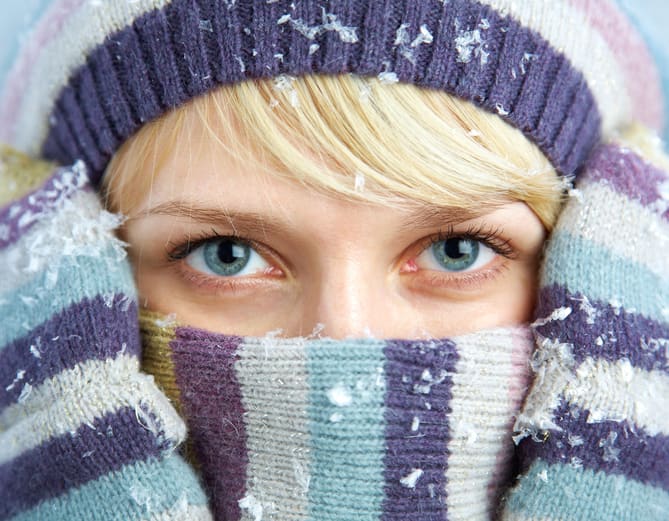Maintaining Healthy Eyes in Winter


Most people have plenty of health concerns during winter. Cold and flu season can be rough, it’s often hard to stay warm, and winter is a risky time for slips and falls. What many don’t realize, though, is that eyes need extra protection during the winter, too. Maintaining healthy eyes in winter requires a little bit of effort, but it’s worth it to keep your vision strong and your eyes in tip-top shape.
- You may not realize it, but you definitely need sunglasses in the winter. It’s easy to remember to wear sunglasses when it’s hot outside, but there are several ways the sun can damage your eyes when it’s cold. Snow is especially problematic because UV rays can enter your eyes directly or from being reflected off of the snow. Wear sunglasses that protect against UV rays, and if it’s especially bright outside, wear a hat or a visor.
- Sometimes, sunglasses aren’t quite enough protection. When you’re being active outdoors in winter, it’s easy to get debris like dirt, bark, slush, or ice into your eyes. Sunglasses protect against some mishaps, but goggles are a better bet for maximum protection. Look for goggles with UV protection built in, or choose goggles that allow you to wear sunglasses underneath.
- What you eat has a huge impact on your eyes. Dry eyes are one of the biggest problems in winter, and eating a diet rich in omega-3 fatty acids can help alleviate this problem. About three and a half ounces of fatty fish like mackerel, tuna, salmon, anchovies, or trout can provide about one gram of omega-3s.
- Staying hydrated is important for every part of your body, including your eyes. Sometimes, people forget to drink water when it’s cold outside, but maintaining the proper hydration can help keep your eyes from feeling dry.
- It’s important to keep your eyes moist in winter. Cold air outside and hot air from the heater indoors can really dry out your eyes, causing them to feel uncomfortable and gritty. Try not to sit too close to heat sources, and use a humidifier or artificial tears to help keep your eyes from getting too dry.
- To keep eyes healthy, keep your hands off of them. Your hands tend to carry bacteria, and putting them up to your eyes can cause an infection. What’s more, rubbing dry eyes can cause them to become even more irritated and uncomfortable.
- For good eye health, take frequent breaks from screens. Whether you’re working at your computer all day or bingeing your favorite show when it’s too cold to want to go out, too much staring at a screen can leave your eyes dry and irritated. Take frequent breaks, adhering to the 20-20-20 rule: every 20 minutes, look away from the computer, focusing on something 20 feet away for at least 20 seconds. It’s also smart to think about blinking because people tend to blink less when they’re staring at a computer screen.
If you are looking for an eye doctor, the Gerstein Eye Institute in Chicago can help. Since 1968, the Gerstein Eye Institute has been providing exceptional ophthalmologic care to patients in the Chicago area. With decades of experience in ophthalmology, our certified professional staff members work hard to provide the kind of personalized care that keeps patients coming back year after year, eventually entrusting the eye health of their children and grandchildren to us as well. To schedule an appointment, call us at (773) 973-3223 or contact us through our website.
